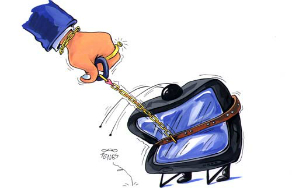Lately, it seems, the excuse “it was a directive from below” is often used to convey decisions adopted by the authorities.
Different news outlets are directed to present any controversial public issue such so that it leaves the impression that the interference was carried out according to the public’s demand. In order to achieve this effect, a collective letter is compiled in which desire and judgment are very tightly intertwined. Such modernized letter-judgments (sometimes also anonymously written) are usually written in the upper echelons of the ruling power pyramid, then brought down below, read, commented on, and discussed on television. And only afterwards do the ruling authorities prudently and faithfully respond to the contents of the letter and get the ball rolling on the issue at hand.
During the Soviet era, it was requested by the workers, now it’s the wishes of kiosks owners or the intention of singers. Basically, this time-tested media technique has not only not exhausted itself, but also strengthened its place in the news media sector.
The stratagem of “a collective letter on request” is used to present problems that elicit a predictable wave of discontent. Though a letter isn’t an official document, it’s a very influential media technique.
It seems that distance is preserved (i.e. all we’re doing is responding to it), while simultaneously, public interest is recalled (i.e. we respect and protect the rights of the letter-writers).
The construction of shops in Mashtots Park in Yerevan, which has occurred in the haze of bypassing different laws, compares very well with the (similarly foggy) decision for Armenia not to participate in this year’s Eurovision Song Contest.
In both cases, the authorities’ decisions reached the public under the cover of public objectives and through the public. Or rather, through those segments of society that during the Soviet years were known as the official intelligentsia appearing on television. Since during our days not only the nomenclatural intellectuals but also pop singers are considered “the government’s mouthpiece,” it is from their lips and in their name that popular (and sometimes also law-breaking) state decisions are heard — through letters, statements and group messages (one says, the other responds, a third opposes, a fourth disagrees with them all, while a fifth defends everyone).
And all the while the authorities, having paused, wait to see how their staged “private, on-behalf-of-the-public” project will develop, which actually makes strides abiding by the rules of TV soap operas. An endless, fabricated chain is created, which, however, doesn’t allow you to understand what’s really happening — more so if the main source of your information is the television.
For example, is Armenia participating in Eurovision or not? A group of artists wrote a letter in favor of not going, the letter was read on Armenia’s Public TV channel, and then came the huge torrent of comments (in favor, opposed, abstained, no comment, attached on the side, disgruntled with life, rapt with life), while the public broadcasting company’s management, who holds the right to make the decision on Armenia’s participation in the song contest, maintains total silence.
It’s obvious that there’s no smoke without a fire and if the letter has been disseminated then a contestant from Armenia is not going to Baku. The letter does not have the force of an official document, but it wasn’t written just like that, after all. Determining the line between fact and assumption, of course, is difficult but possible: some things simply have to not be listened to, while others, inferred.
This practice is also used in reporting on and presenting the matter of shop construction in Mashtots Park. Environmentalists and politically active citizens have been protesting the several-storeys-high shops (which, for some reason, are called kiosks) dismantled on Abovyan St. in central Yerevan and moved to the park. They are trying to prevent the privatization of public spaces and not allow the park to be paved over. According to the municipality, nothing out of the ordinary is happening — the city is simply being reshaped and privatized as usual. But even in this case, when a “high-voltage point” has been created in Mashtots Park, city hall prefers to communicate with the public through letters and the press conferences of pro-government artistic and cultural elite, which allows the decisions to be presented in a slightly marginal, creative and passionate way. Well, “they’re artists, after all… they’ll say whatever they want,” and so on and so forth. But it’s due to the statements of these individuals that manipulation of public opinion is developed and clarified.
Recall, the first pro-government artists and cultural workers to visit Mashtots Park (such as Artistic Director of the State Chamber Theatre of Armenia Ara Yernjakyan) used harsh epithets to describe the activists, while the second descent (architect Levon Igityan, actor Hrant Tokhatyan and others) used milder, more chummy cliches. Coming at the end was the heavy artillery used to telling lies (writer and publicist Meruzhan Ter-Gulanyan), who said on television that construction in the park was halted.
In truth, nothing has been halted and much is unknown (made public are neither the names of the shop owners nor the written agreements with them — nor the real authors of the letter protesting Armenia’s participation in Eurovision).
There’s the impression that remaining in uncertainty is a job that has its advantages: the more commentary there is, the more broadcasts and articles on the subject. And the more broadcasts there are, the more letters. Not only are Armenian airwaves filled, but also the authorities are doing something — testing the circle of their influence. Let’s say, they stick the label “You’re ours” on any one and send him or her to hotspots (on television or to the park) where there’s no one to hear them.
Nune Hakhverdyan







